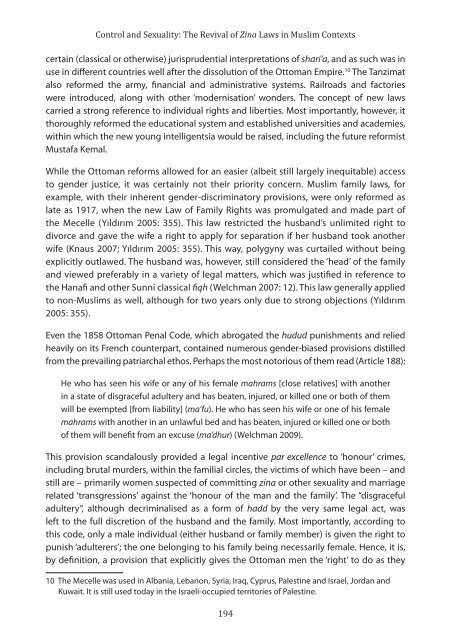control and sexuality
control and sexuality
control and sexuality
- No tags were found...
Create successful ePaper yourself
Turn your PDF publications into a flip-book with our unique Google optimized e-Paper software.
Control <strong>and</strong> Sexuality: The Revival of Zina Laws in Muslim Contextscertain (classical or otherwise) jurisprudential interpretations of shari’a, <strong>and</strong> as such was inuse in different countries well after the dissolution of the Ottoman Empire. 10 The Tanzimatalso reformed the army, financial <strong>and</strong> administrative systems. Railroads <strong>and</strong> factorieswere introduced, along with other ‘modernisation’ wonders. The concept of new lawscarried a strong reference to individual rights <strong>and</strong> liberties. Most importantly, however, itthoroughly reformed the educational system <strong>and</strong> established universities <strong>and</strong> academies,within which the new young intelligentsia would be raised, including the future reformistMustafa Kemal.While the Ottoman reforms allowed for an easier (albeit still largely inequitable) accessto gender justice, it was certainly not their priority concern. Muslim family laws, forexample, with their inherent gender-discriminatory provisions, were only reformed aslate as 1917, when the new Law of Family Rights was promulgated <strong>and</strong> made part ofthe Mecelle (Yıldırım 2005: 355). This law restricted the husb<strong>and</strong>’s unlimited right todivorce <strong>and</strong> gave the wife a right to apply for separation if her husb<strong>and</strong> took anotherwife (Knaus 2007; Yıldırım 2005: 355). This way, polygyny was curtailed without beingexplicitly outlawed. The husb<strong>and</strong> was, however, still considered the ‘head’ of the family<strong>and</strong> viewed preferably in a variety of legal matters, which was justified in reference tothe Hanafi <strong>and</strong> other Sunni classical fiqh (Welchman 2007: 12). This law generally appliedto non-Muslims as well, although for two years only due to strong objections (Yıldırım2005: 355).Even the 1858 Ottoman Penal Code, which abrogated the hudud punishments <strong>and</strong> reliedheavily on its French counterpart, contained numerous gender-biased provisions distilledfrom the prevailing patriarchal ethos. Perhaps the most notorious of them read (Article 188):He who has seen his wife or any of his female mahrams [close relatives] with anotherin a state of disgraceful adultery <strong>and</strong> has beaten, injured, or killed one or both of themwill be exempted [from liability] (ma’fu). He who has seen his wife or one of his femalemahrams with another in an unlawful bed <strong>and</strong> has beaten, injured or killed one or bothof them will benefit from an excuse (ma’dhur) (Welchman 2009).This provision sc<strong>and</strong>alously provided a legal incentive par excellence to ‘honour’ crimes,including brutal murders, within the familial circles, the victims of which have been – <strong>and</strong>still are – primarily women suspected of committing zina or other <strong>sexuality</strong> <strong>and</strong> marriagerelated ‘transgressions’ against the ‘honour of the man <strong>and</strong> the family’. The “disgracefuladultery”, although decriminalised as a form of hadd by the very same legal act, wasleft to the full discretion of the husb<strong>and</strong> <strong>and</strong> the family. Most importantly, according tothis code, only a male individual (either husb<strong>and</strong> or family member) is given the right topunish ‘adulterers’; the one belonging to his family being necessarily female. Hence, it is,by definition, a provision that explicitly gives the Ottoman men the ‘right’ to do as they10 The Mecelle was used in Albania, Lebanon, Syria, Iraq, Cyprus, Palestine <strong>and</strong> Israel, Jordan <strong>and</strong>Kuwait. It is still used today in the Israeli-occupied territories of Palestine.194


